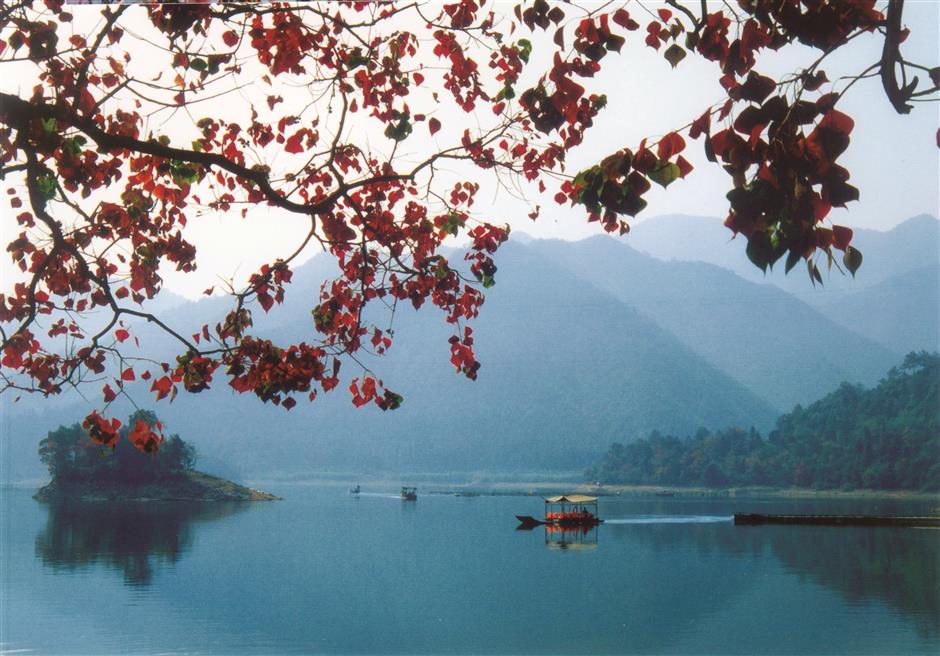For a nearby getaway, Fuyang offers year-round appeal

Fuchun River
Throughout the year, Hangzhou’s Fuyang District and its surrounding areas offer some great getaways. Open your calendar, take a look at our list and start planning your trip in and around the district.
Snow has already come to northern China, and frosts are appearing in the south. In the mountain areas of Fuyang, the vibrant green colors of undulating forests fade a bit in the winter, but its charm doesn’t diminish.
This is the perfect time to enjoy the harvest of xiangfei (torreya grandis, a kind of nut). In mist-shrouded Dongqiao Town, almost every hamlet boasts hundreds of centuries-old xiangfei trees.
While most other nuts are machine-roasted in the interest of efficiency, xiangfei are still roasted by hand. Usually, it takes at least three months to process xiangfei due to the traditional preparation techniques. Though harvested in October, December is the best time to taste the nuts.

Foreigners experience the farming fun by planting rice seedlings.
When temperatures begin to rise in spring, the lush peach blossoms in Xindeng Town become a new attraction in Fuyang. A peach blossom festival is held in a local park where more than 266 hectares of peach trees are in bloom.
The town is not only a great place to see flowers but also to sample local food specialties made of peaches or inspired by the fruit. In addition, it boasts several hostels that allure tourists in droves by virtue of their unique vibe and décor.
Huaji Taoyao Boutique Hostel is named after an ancient poem about peach blossoms. Its designers used natural materials and craftsmanship to recreate a classical ambience, with the aim of bringing guests back to a time when life was more slow-paced.
If you are attracted to a style typical of Jiangnan (the region in the southern reaches of the Yangtze River), then Youyicun Qingting Boutique Hostel is the place for you. Its designers have created an interior décor characterized by a minimalist wooden style. They have also retained the tranquility and unassuming qualities of the area’s traditional structures, which appear in black and white shades, as in a traditional Chinese ink-wash paintings.
The hostel is juxtaposed against an ancient ginkgo tree park. Most of the trees were planted over 100 years ago.
In late November and early December, tourists can enjoy the yellow scenery, walk on sun-dappled paths and feel the comforting scrunch of leaves beneath their feet.
In early summer, visitors to Fuyang can head to local plantations to pick mulberries and eat at family-run guesthouses. Some plantations let tourists enter free, charging them only for the fruit they pick.
Fuyang features a high altitude and large temperature fluctuations: advantageous conditions for growing mulberries. In recent years, farmers have begun to cultivate the red and purple varieties.
In addition to cultivated mulberries, the area also features wild mulberry trees. In Xinsha Islet and Xindeng Town, locals climb mountains to pluck the ripe, succulent berries, most of which they sell.
Autumn around Fuyang District is known for its kaleidoscope of colors. Gingko, maple, and phoenix trees paint the city a mix of yellow, orange, red, crimson and gold.

Longmen Ancient Town is one of the most popular attractions in Fuyang.
If you tour Fuyang during this season, hiking along Dongpo Ancient Road is highly recommended. The sight of the colorful leaves against a clear blue sky is one of the great charms of this area.
The original name of this ancient road was Gexi, but it was later renamed for Su Dongpo, a great poet and statesman during the Song Dynasty (960-1279).
At the time, Su was the mayor of Hangzhou. Meanwhile, the head of Fuyang County, Chao Duanyou, had a son who wrote some popular poems. Su was a fan of the poems and became a family friend.
Invited by the Chao family, Su traveled from Hangzhou to Fuyang along Gexi Ancient Road several times a year. On one occasion, Su was inspired by the roadside view and created a couple of poems to commemorate it.
















